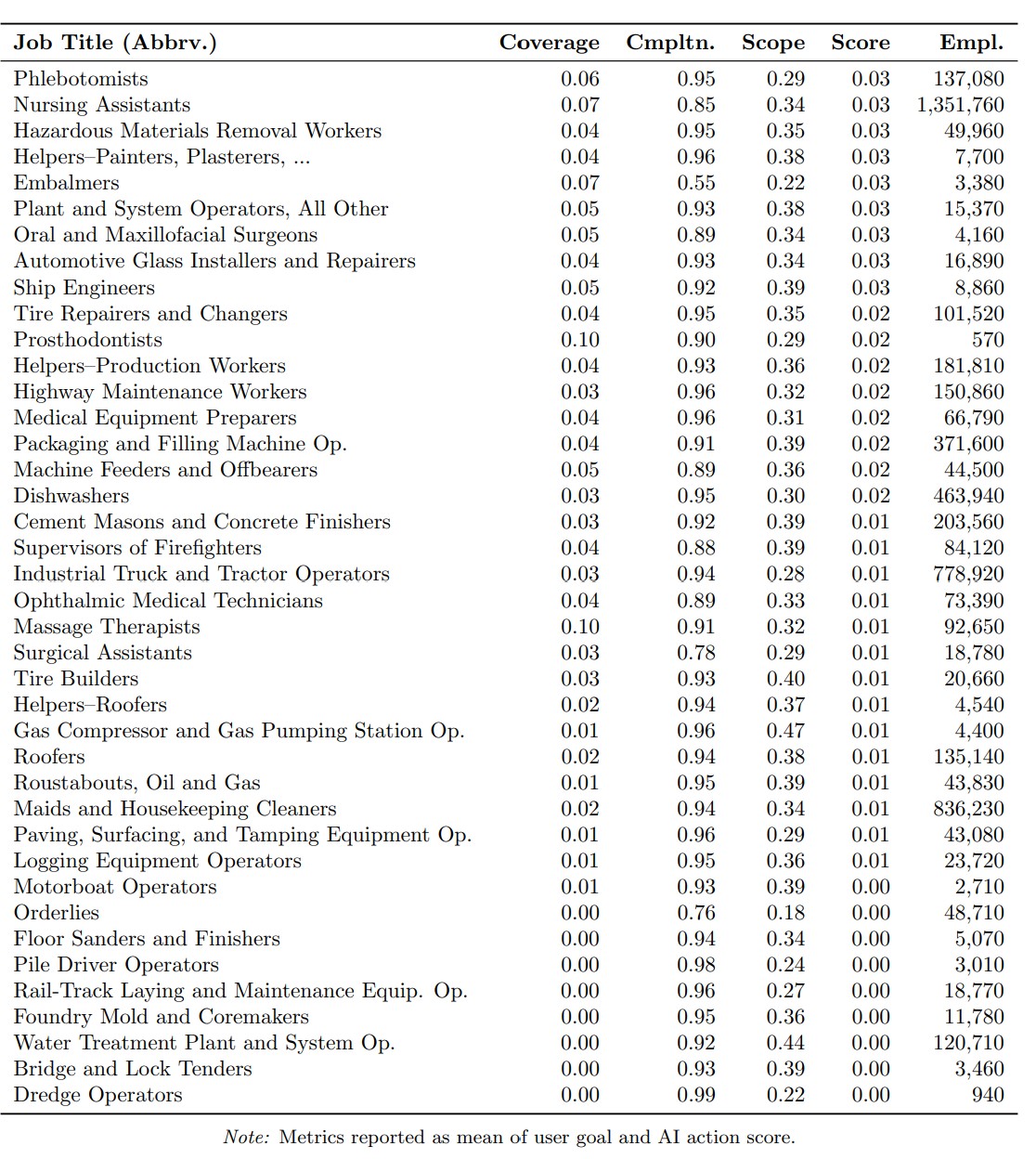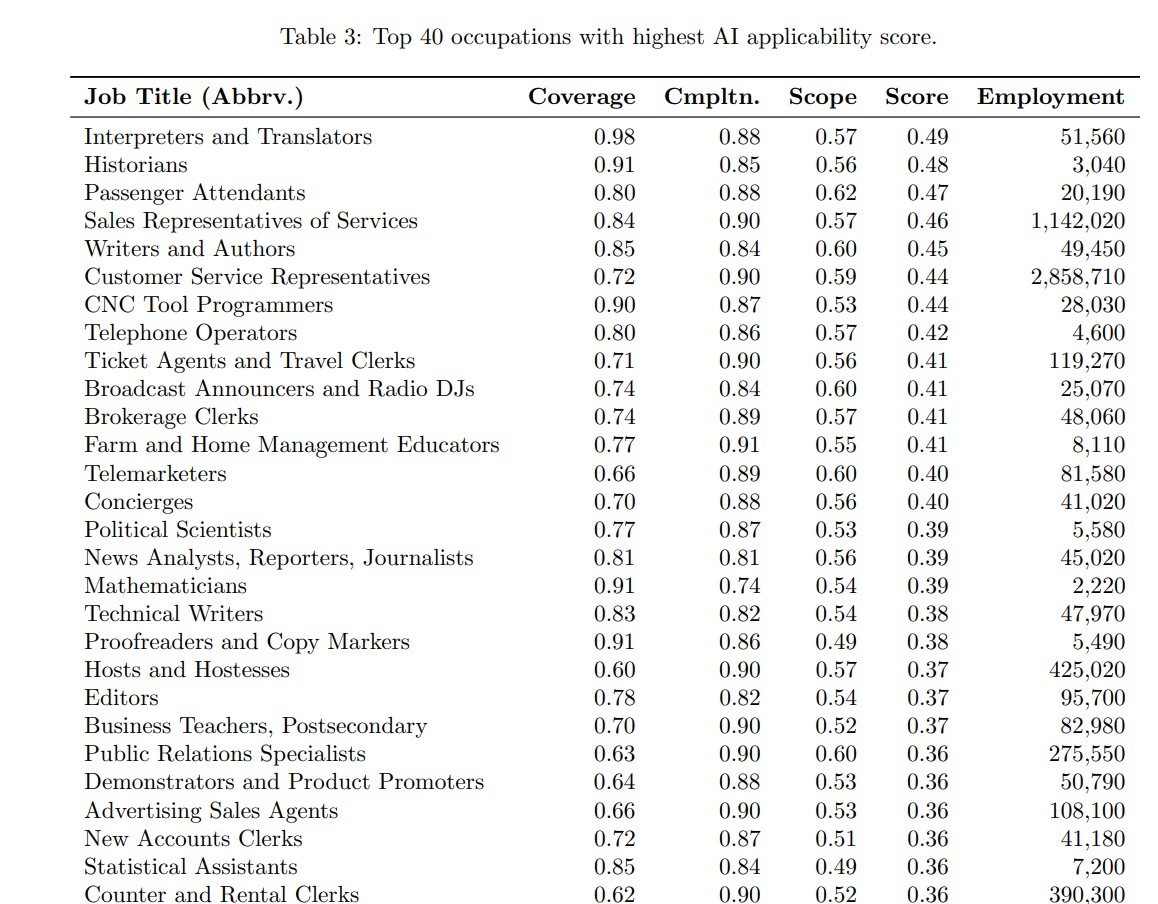Artificial intelligence is reshaping the workplace at lightning speed, but not all roles are equally vulnerable. A major research project by Microsoft looked at hundreds of thousands of conversations between real people and the company's Bing Copilot AI to see where AI actually helps and where it falls short. The data show that AI struggles with work that depends on physical presence, hands‑on skills and genuine human connection
[1]. In other words, there are still plenty of career paths where human expertise remains irreplaceable.
## What the research says
Microsoft's team used three measures — coverage (how often AI is used for a task), completion rate (whether it can finish the task) and impact scope (the portion of the job it can assist with) — to build AI applicability scores for different roles. The lowest scores went to occupations that require manual dexterity, real‑world observation and interpersonal care. This includes roles like dredge operators, water‑treatment plant operators, roofers, nurses, welders and phlebotomists.
Conversely, the research found that AI excels at writing, editing and information search and struggles with tasks involving data analysis and visual design. Jobs that demand a bachelor's degree tended to show more AI assistance, but this correlation was weak and did not translate into higher wages. Importantly, the study emphasizes that AI is an assistant, not a replacement — it doesn't perform every task in any single job, and in many cases it simply augments human effort.
To visualize the difference between jobs AI can and can't replace, the article includes charts showing occupations with the lowest and highest AI applicability scores. The first chart (below) lists 40 roles least likely to be replaced, many of which involve machinery operation or patient care:

Jobs least affected by AI based on Microsoft research
A second graphic in the article highlights roles most affected by AI, such as interpreters, writers, sales representatives and customer‑service agents – jobs that revolve around communication and information processing:

Jobs most affected by AI according to Microsoft research
## Why physical and human‑centric work remains safe
AI's limitations stem from its lack of a body and emotions. It can't lift heavy objects, maneuver a forklift or comfort a patient. Roles like construction workers, nurses, massage therapists, machine operators and emergency responders depend on manual dexterity, sensory perception and situational awareness. These jobs are tied to the real world: they require seeing, touching, smelling and improvising in messy, dynamic environments. Machines may assist — e.g., surgical robots help doctors perform precise operations — but human oversight and physical presence remain essential.
Jobs built on trust and human relationships are also tough to automate. Patients expect warmth from nurses and therapists; families rely on funeral directors to handle grief with compassion; communities depend on firefighters and maintenance crews when disasters strike. These experiences can't be replicated by a chatbot. As a result, caregiving and community‑based roles are likely to remain in high demand even as AI capabilities advance.
## How to future‑proof your career
**Build human skills.** Employers will continue to value communication, problem‑solving and empathy. These capabilities are transferable across industries and difficult to automate.
**Combine physical and digital expertise.** Many of the safest jobs blend hands‑on work with technology. Learning how to operate modern machinery, read digital dashboards or use AI‑powered diagnostics can make you indispensable.
**Gain experience through micro‑internships.** Short‑term, paid projects — sometimes called micro‑internships — allow students and career‑changers to test different roles while building networks. Platforms like
Parker Dewey describe micro‑internships as flexible projects that let participants explore career paths, develop skills and expand professional contacts
[2]. Completing a variety of micro‑internships can help you discover niches where your strengths align with market demand.
**Stay curious about new roles.** AI is creating entirely new job categories. For example, companies now hire AI trainers or prompt engineers to design and refine language‑model interactions, roles that didn't exist a few years ago. Salaries for these positions range from US$90k–$140k, and demand for prompt‑engineering specialists has grown by roughly 400%
[3]. The catch? Only 2.5% of AI job postings are truly entry‑level, so employers expect hands‑on experience or domain expertise.
## Looking beyond 2025
The takeaway from Microsoft's research is clear: AI will change how we work, but it won't eradicate human workers. Roles that involve physical tasks, complex coordination or emotional intelligence will remain essential. Knowledge‑based roles will evolve to become more collaborative, with professionals using AI as a tool for research, writing and analysis. History shows that new technology often creates more jobs than it destroys, from the ATM era that ultimately increased bank employment to the internet boom that spawned entire industries.
As we look beyond 2025, remember that your ability to learn, adapt and leverage AI will determine your success. Invest in yourself, seek out hands‑on experience and stay open to emerging roles. By doing so, you'll be well‑positioned for a future where humans and machines work together — and where human strengths remain irreplaceable.
Ready to take the next step?
SimpleApply uses AI to match you with opportunities that fit your skills and goals. Sign up today to explore roles that leverage AI as a partner rather than a competitor.
**References:**
[1] [40 Jobs AI Can't Replace in 2025, According to Microsoft Research](https://www.finalroundai.com/blog/jobs-ai-cant-replace-in-2025)
[2] [Launch Your Career | Micro-Internship and Freelance Gigs for College Students | Parker Dewey](https://www.parkerdewey.com/career-launchers)
[3] [Navigating the AI Job Market in 2025: Your Complete Guide to Landing High-Paying AI Careers](https://www.ainewshub.org/post/navigating-the-ai-job-market-in-2025-your-complete-guide-to-landing-high-paying-ai-careers)





